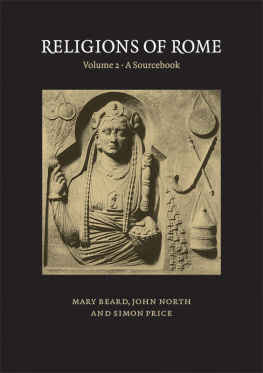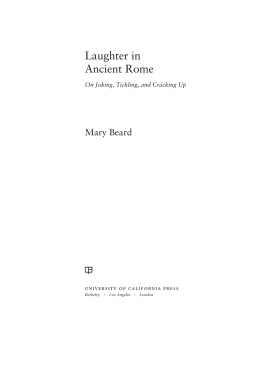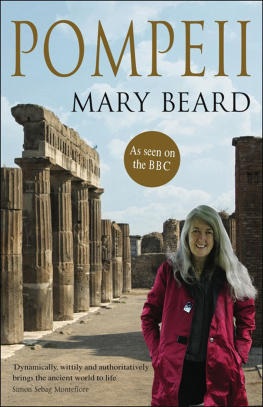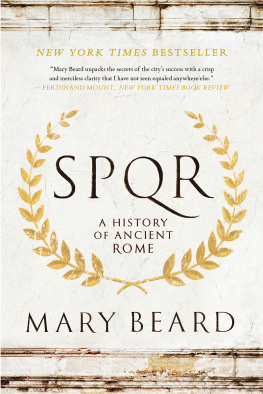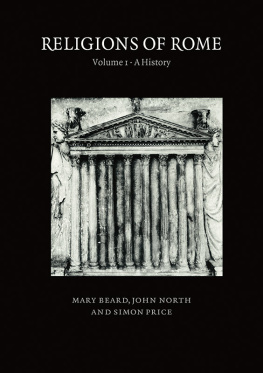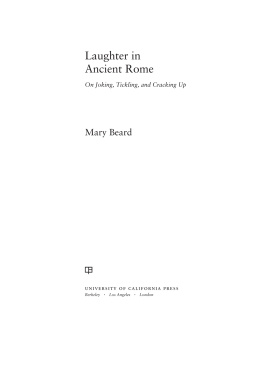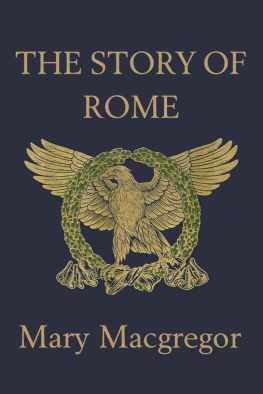Mary Beard - Religions of Rome Volume 2 of 2
Here you can read online Mary Beard - Religions of Rome Volume 2 of 2 full text of the book (entire story) in english for free. Download pdf and epub, get meaning, cover and reviews about this ebook. year: 1998, publisher: Cambridge University Press, genre: Religion. Description of the work, (preface) as well as reviews are available. Best literature library LitArk.com created for fans of good reading and offers a wide selection of genres:
Romance novel
Science fiction
Adventure
Detective
Science
History
Home and family
Prose
Art
Politics
Computer
Non-fiction
Religion
Business
Children
Humor
Choose a favorite category and find really read worthwhile books. Enjoy immersion in the world of imagination, feel the emotions of the characters or learn something new for yourself, make an fascinating discovery.
- Book:Religions of Rome Volume 2 of 2
- Author:
- Publisher:Cambridge University Press
- Genre:
- Year:1998
- Rating:3 / 5
- Favourites:Add to favourites
- Your mark:
- 60
- 1
- 2
- 3
- 4
- 5
Religions of Rome Volume 2 of 2: summary, description and annotation
We offer to read an annotation, description, summary or preface (depends on what the author of the book "Religions of Rome Volume 2 of 2" wrote himself). If you haven't found the necessary information about the book — write in the comments, we will try to find it.
Religions of Rome Volume 2 of 2 — read online for free the complete book (whole text) full work
Below is the text of the book, divided by pages. System saving the place of the last page read, allows you to conveniently read the book "Religions of Rome Volume 2 of 2" online for free, without having to search again every time where you left off. Put a bookmark, and you can go to the page where you finished reading at any time.
Font size:
Interval:
Bookmark:
This book reveals the extraordinary diversity of ancient Roman religion. A comprehensive sourcebook, it presents a wide range of documents illustrating religious life in the Roman world from the foundations of the city in the eighth century B.C. to the Christian capital more than a thousand years later. Each document is given a full introduction, explanatory notes and bibliography, and acts as a starting point for further discussion.
Through paintings, sculptures, coins and inscriptions, as well as literary texts in translation, the book explores the major themes and problems of Roman religion, such as sacrifice, the religious calendar, divination, ritual, and priesthood. Starting from the archaeological traces of the earliest cults of the city, it finishes with a series of texts in which Roman authors themselves reflect on the nature of their own religion, its history, even its funny side. In between, the widening scope of religious choice, both within and outside official cults of the state, provides a major theme. Judaism and Christianity are given full coverage, as important elements in the religious world of the Roman empire.
The companion volume, Religions of Rome 1: A History, offers a narrative account of the religions of Rome and a wider context for the documents discussed in this volume.
Religions of Rome
Volume 2
A Sourcebook
VOLUME 2
A Sourcebook
MARY BEARD
Reader in Classics in the University of Cambridge, and Fellow of Newnham College
JOHN NORTH
Professor of History, University College London
SIMON PRICE
Fellow and Tutor, Lady Margaret Hall, Oxford

CAMBRIDGE UNIVERSITY PRESS
Cambridge, New York, Melbourne, Madrid, Cape Town, Singapore, So Paulo, Delhi, Mexico City
Cambridge University Press
The Edinburgh Building, Cambridge CB2 8RU, UK
Published in the United States of America by Cambridge University Press, New York
www.cambridge.org
Information on this title: www.cambridge.org/9780521450157
Mary Beard, John North and Simon Price 1998
This publication is in copyright. Subject to statutory exception and to the provisions of relevant collective licensing agreements, no reproduction of any part may take place without the written permission of Cambridge University Press.
First published 1998
15th printing 2013
Printed and bound in the United Kingdom by the MPG Books Group
A catalogue record for this publication is available from the British Library
ISBN 978-0-521-45646-3 Paperback
Cambridge University Press has no responsibility for the persistence or accuracy of URLs for external or third-party internet websites referred to in this publication, and does not guarantee that any content on such websites is, or will remain, accurate or appropriate. Information regarding prices, travel timetables and other factual information given in this work are correct at the time of first printing but Cambridge University Press does not guarantee the accuracy of such information thereafter.
We would like to express our warm thanks to those who gave us advice on the translations in this volume, and helped us in many other ways: in particular to our research assistant, Geraldine Herbert-Brown (funded by the British Academy); also to Jonathan Barnes ().
Religions of Rome the traditional, polytheistic religions of the city of Rome and its empire have a history of over 1, 200 years. It is a history that stretches from the citys origins in the eighth century B.C. to the fifth century A.D., when Christianity was firmly and officially established as the religion of the Roman empire. This book draws on material from throughout this long period, arranging it largely by theme gods, the calendar, temples, divination, religious officials, and so forth. Of course, the character of Roman religion changed enormously during that time, as Rome itself developed from a small village in central Italy to the capital of a world empire, incorporating a wide diversity of religious traditions and beliefs. This book recognizes those changes, but does not attempt to present a chronological account. For that the reader should turn to our companion volume, Religions of Rome 1: A History.
There is more at stake in this arrangement than simply a choice of chapter headings. By grouping the material thematically across the centuries, we are suggesting that (despite all the changes) the religions of Rome did retain certain significant constants over their long history. We are suggesting, for example, that Roman sacrifice of the fifth century B.C. had something important in common with Roman sacrifice of the second century A.D.; and that it can be useful to consider these religious forms synchronically, across time, not only (as we choose to do in the companion volume) as part of a changing, diachronic development.
Any modern analysis inevitably simplifies the complex and changing set of cults, practices, beliefs and experiences that once made up the religions of Rome. So, in this book, the bulk of the material cited comes from the three central centuries of the whole period the first century B.C. to the second century A.D. Although we have included important evidence from both earlier and later, our choice of entries reflects the facts of survival: more and richer evidence for Roman pagan religion (Christian writings are another story...) survives from these three centuries than any other. But, in addition to this chronological bias, we have also (for reasons of space and coherence) focused largely on material concerned with the city of Rome and Italy. Again, not exclusively. We have tried to represent something of the complexity and diversity of the religious traditions of the Roman empire as a whole: we have illustrated, for example, the export of various aspects of central Roman religion to the provinces, as well as the growth within Rome itself of religions (including Judaism and Christianity) whose origins lay elsewhere in the empire. But we have not given a full account of the religious life of any Roman province; and we have considered the development of Judaism and Christianity, or other foreign religions, mainly in relation to their interaction with Rome and traditional Roman religion (though we have illustrated the diversity of practice and belief within each religion).
Even so the process of selection has been difficult. Religion was embedded in almost every aspect of Roman life; and the range of source material is enormous from the specifically religious/philosophical treatises of Cicero (On Divination, On the Nature of the Gods) and Lucretius (On the Nature of Things) to pious discussions of how divine anger might be appeased, or the joking appearances of the gods in Roman comic drama. Our guiding principle has been to use the texts we cite argumentatively, and to show that Roman religion was not a static body of doctrine, but a subject of debate, negotiation, definition and re-definition (explicitly or implicitly) for the Romans themselves. This does not mean that we have heavily weighted our selection towards those texts in which Roman authors self-consciously discuss their own religion. (We have not, in other words, filled the book with long extracts from Cicero and Lucretius.) Instead we have tried to put those specifically religious discussions in the context of the other ways (whether more casual, humorous or indirect) in which Romans represented religion to themselves. These other ways include polemic and attack, from both inside and outside the traditional pagan system. We have often chosen to illustrate Christian polemic against traditional Roman beliefs and practices. This is not intended to be a judgement on Roman religion from a Judaeo-Christian viewpoint, but to stress that the interaction between traditional paganism and Christianity is an important element in our understanding of
Next pageFont size:
Interval:
Bookmark:
Similar books «Religions of Rome Volume 2 of 2»
Look at similar books to Religions of Rome Volume 2 of 2. We have selected literature similar in name and meaning in the hope of providing readers with more options to find new, interesting, not yet read works.
Discussion, reviews of the book Religions of Rome Volume 2 of 2 and just readers' own opinions. Leave your comments, write what you think about the work, its meaning or the main characters. Specify what exactly you liked and what you didn't like, and why you think so.

